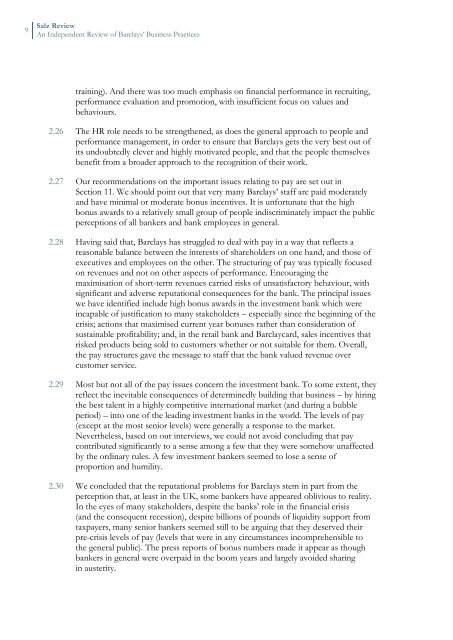Salz Review - Wall Street Journal
Salz Review - Wall Street Journal
Salz Review - Wall Street Journal
Create successful ePaper yourself
Turn your PDF publications into a flip-book with our unique Google optimized e-Paper software.
9<br />
<strong>Salz</strong> <strong>Review</strong><br />
An Independent <strong>Review</strong> of Barclays’ Business Practices<br />
training). And there was too much emphasis on financial performance in recruiting,<br />
performance evaluation and promotion, with insufficient focus on values and<br />
behaviours.<br />
2.26 The HR role needs to be strengthened, as does the general approach to people and<br />
performance management, in order to ensure that Barclays gets the very best out of<br />
its undoubtedly clever and highly motivated people, and that the people themselves<br />
benefit from a broader approach to the recognition of their work.<br />
2.27 Our recommendations on the important issues relating to pay are set out in<br />
Section 11. We should point out that very many Barclays’ staff are paid moderately<br />
and have minimal or moderate bonus incentives. It is unfortunate that the high<br />
bonus awards to a relatively small group of people indiscriminately impact the public<br />
perceptions of all bankers and bank employees in general.<br />
2.28 Having said that, Barclays has struggled to deal with pay in a way that reflects a<br />
reasonable balance between the interests of shareholders on one hand, and those of<br />
executives and employees on the other. The structuring of pay was typically focused<br />
on revenues and not on other aspects of performance. Encouraging the<br />
maximisation of short-term revenues carried risks of unsatisfactory behaviour, with<br />
significant and adverse reputational consequences for the bank. The principal issues<br />
we have identified include high bonus awards in the investment bank which were<br />
incapable of justification to many stakeholders – especially since the beginning of the<br />
crisis; actions that maximised current year bonuses rather than consideration of<br />
sustainable profitability; and, in the retail bank and Barclaycard, sales incentives that<br />
risked products being sold to customers whether or not suitable for them. Overall,<br />
the pay structures gave the message to staff that the bank valued revenue over<br />
customer service.<br />
2.29 Most but not all of the pay issues concern the investment bank. To some extent, they<br />
reflect the inevitable consequences of determinedly building that business – by hiring<br />
the best talent in a highly competitive international market (and during a bubble<br />
period) – into one of the leading investment banks in the world. The levels of pay<br />
(except at the most senior levels) were generally a response to the market.<br />
Nevertheless, based on our interviews, we could not avoid concluding that pay<br />
contributed significantly to a sense among a few that they were somehow unaffected<br />
by the ordinary rules. A few investment bankers seemed to lose a sense of<br />
proportion and humility.<br />
2.30 We concluded that the reputational problems for Barclays stem in part from the<br />
perception that, at least in the UK, some bankers have appeared oblivious to reality.<br />
In the eyes of many stakeholders, despite the banks’ role in the financial crisis<br />
(and the consequent recession), despite billions of pounds of liquidity support from<br />
taxpayers, many senior bankers seemed still to be arguing that they deserved their<br />
pre-crisis levels of pay (levels that were in any circumstances incomprehensible to<br />
the general public). The press reports of bonus numbers made it appear as though<br />
bankers in general were overpaid in the boom years and largely avoided sharing<br />
in austerity.
















